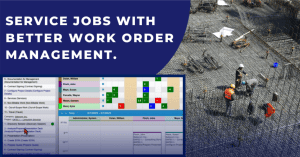Running a service business today requires more than skill, commitment, and a dedicated team. It requires precision. Every hour, every part, and every expense must be tracked and managed efficiently. That’s where project management software steps in. The right platform can transform your business from juggling spreadsheets and sticky notes into a seamless, data-driven operation that connects your entire organization, from sales to billing.
If you’ve ever wondered what makes one software system better than another or how to find the perfect fit for your service-based business, you’re in the right place. Let’s dive into the key features to look for and why an integrated approach makes all the difference.
The Growing Need for Connected Systems
Service businesses face unique challenges. Unlike product-based companies that focus on inventory, service businesses live and breathe people, time, and customer satisfaction. That means managing multiple moving parts simultaneously: scheduling jobs, assigning technicians, tracking expenses, managing customer relationships, and making sure the final invoice is accurate.
In the past, businesses relied on disconnected systems, one for CRM, another for job management, another for billing, and maybe a spreadsheet for tracking project costs. But as competition increases and clients expect faster, more transparent service, the old way simply doesn’t cut it anymore. Modern service businesses need connected solutions that unify all operations under one roof.
Why Integration Matters More Than Ever
Imagine a world where your CRM, project management, and billing systems all talk to each other. Leads flow seamlessly into jobs. Technicians receive automatic work orders. Time and materials are tracked instantly. Invoices are generated without double entry. That’s the power of integration.
When everything operates in a connected environment, you eliminate silos and errors. Information flows freely across departments, giving you complete visibility into what’s happening at every stage of a project. Integration doesn’t just make life easier; it ensures accuracy, improves profitability, and enhances customer satisfaction.
CRM: The Heart of a Connected Service Business
At the core of every successful service business is strong customer relationship management (CRM). A powerful CRM does more than store contact information; it helps you build stronger relationships, anticipate client needs, and deliver exceptional service.
For project-driven businesses, CRM becomes even more vital. When your project management software is embedded within your CRM, you don’t just track customer interactions; you track their entire service journey. From the initial inquiry to project completion and final invoicing, every detail lives in one centralized system.
A CRM-connected platform allows your sales and service teams to collaborate effortlessly. Sales teams can see open projects, upcoming renewals, or customer service issues, while technicians can access customer history directly in the field. The result? A smoother experience for both your team and your clients.
Field Service Management: Keeping Teams in Sync
Field service operations are the lifeblood of many service-based organizations. Whether your team installs, repairs, or maintains equipment, scheduling and dispatching can make or break your efficiency.
Modern project management software designed for service businesses should include robust field service management tools. Look for features like:
- Smart Scheduling: Automatically match technicians with jobs based on skill, location, and availability.
- Mobile Access: Give field staff real-time access to work orders, customer data, and project updates.
- GPS Tracking: Keep tabs on where your team is and optimize routes to reduce travel time.
- Instant Communication: Enable two-way updates between office and field teams for faster responses.
These features help your business stay flexible and responsive, ensuring that every customer receives timely, professional service.
Job and Project Management: From Start to Finish
Project management for service companies goes beyond simple task tracking. It’s about managing profitability, resources, and timelines across multiple clients and teams. The right solution should help you plan projects efficiently, monitor progress, and adjust as needed without losing visibility.
Key project management features to look for include:
- Gantt Charts and Dashboards: Visualize progress at a glance.
- Task Automation: Reduce repetitive data entry and automate job assignments.
- Resource Allocation: Assign the right people, tools, and materials for each project.
- Expense and Time Tracking: Capture every billable hour and material automatically.
With these capabilities, your project managers can focus on strategy and service quality instead of chasing down spreadsheets.
Billing and Financial Management: Accuracy You Can Count On
One of the biggest pain points for service businesses is ensuring accurate billing. Lost timesheets, missed expenses, and mispriced jobs can quickly erode profit margins. That’s why a strong connection between your project management system and your ERP (enterprise resource planning) system is crucial.
When your software integrates with ERP, every hour, part, and expense is captured once, priced correctly, approved, and invoiced automatically. No more copying and pasting data or manually reconciling numbers. Your accounting team will thank you, and your clients will appreciate timely, accurate invoices.
This integration also improves forecasting and reporting, helping you make data-driven decisions that strengthen your bottom line.
Reporting and Analytics: Data That Drives Success
You can’t improve what you can’t measure. Effective project management software should include powerful reporting and analytics tools that give you insights into performance, profitability, and customer satisfaction.
Look for systems that offer customizable dashboards where you can track:
- Project profitability by client or service line
- Technician productivity and utilization rates
- Customer satisfaction and response times
- Budget vs. actual cost comparisons
Having access to real-time data empowers you to identify trends, eliminate inefficiencies, and make informed strategic decisions.
Collaboration: The Secret to Seamless Operations
A connected service business thrives on collaboration. When teams work together across departments, information is shared faster, mistakes are reduced, and customer experiences improve.
Modern project management platforms should offer collaborative tools like shared dashboards, comment threads, and file attachments that allow teams to work together regardless of location. Whether your team is in the office or out in the field, everyone should be working from the same playbook.
Collaboration also strengthens transparency with clients. With a single source of truth, you can easily provide updates, share timelines, and build trust through open communication.
Cloud-Based Flexibility and Security
Today’s workforce is more mobile and distributed than ever. Cloud-based project management software ensures that your teams can access the system from anywhere, such as on a laptop, tablet, or smartphone. This flexibility allows service businesses to stay productive in the field, at home, or in the office.
In addition to convenience, look for platforms that prioritize data security. Role-based permissions, encrypted connections, and automatic backups help protect your business from data loss or unauthorized access.
Scalability: Grow Without Growing Pains
As your service business expands, your software should grow with you. A scalable system can adapt to increased workloads, more users, and new service lines without major disruptions.
Scalability also includes integration flexibility. The best systems connect easily to your existing tools, like CRM, ERP, and communication platforms, so you can expand functionality as your business evolves.
Why TimeLinx Stands Out
If all this sounds like the dream solution for your service business, you’re not far off. TimeLinx makes that dream a reality. Unlike traditional project management software that focuses solely on tasks and timelines, TimeLinx embeds project and service management directly within CRM and connects seamlessly to ERP.
That means every hour, part, and expense is captured once, priced correctly, approved, and invoiced automatically. No more toggling between programs or risking costly errors. Sales, service, scheduling, and billing all work together in one connected ecosystem.
With TimeLinx, you can unify your sales, service, and financial teams on a single platform. Whether you’re managing field technicians, scheduling complex projects, or tracking profitability, everything you need is right where you expect it.
The result? A more efficient operation, happier customers, and a business that runs smoothly from the first customer interaction to the final invoice.
Ready to Streamline Your Service Business?
Choosing the right project management software is one of the most important decisions you’ll make for your service business. The right solution will not only save time and reduce errors but also give you the visibility and control you need to drive profitability.
If you’re ready to connect CRM, jobs, customer service, and field service in one powerful system, TimeLinx is ready to help. It’s time to unify your sales, service, scheduling, and billing in a single connected platform.
Say goodbye to spreadsheets, manual processes, and costly mistakes. Say hello to a smarter, more connected way to manage your service business.
Request more information today and discover how you can transform your operations from the ground up.




